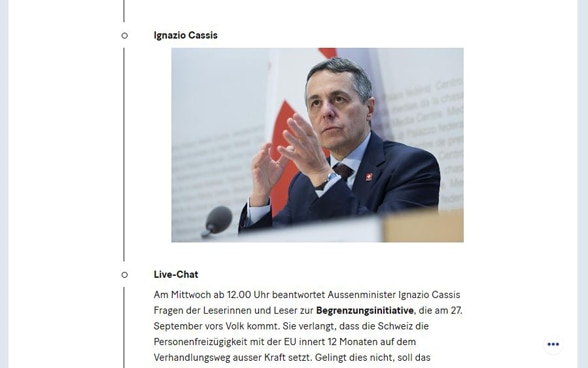"Bilateral agreements give us freedom and prosperity"
In a live chat hosted by the newspaper 20 Minuten, Federal Councillor Cassis answered readers' questions on the Limitation Initiative. Adoption of the initiative to limit immigration would damage Switzerland as a business location, he said.

Federal Councillor Cassis answers questions on the Limitation Initiative in a live chat hosted by 20 Minuten. Adoption of the initiative would damage Switzerland as a business location, he warned. © FDFA
On 27 September, the Swiss electorate will decide whether to maintain the free movement of persons between Switzerland and the EU in a popular vote which also includes the purchase of fighter jets, the Hunting Act, child tax deductions and paternity leave. If the federal popular initiative 'For moderate immigration' (Limitation Initiative) were adopted, it would put an end not only to the Agreement on the Free Movement of Persons, but also to the seven core treaties that make up the Bilaterals I package of agreements between Switzerland and the EU. The seven agreements would be automatically terminated.
The package of agreements, which includes air transport, mutual recognition of industrial conformity and research, are "tailored to our needs and give us freedom and prosperity," emphasised Mr Cassis. "We should not throw them overboard lightly and accept years of uncertainty."
Some of the live chat questions raised concerns about booming construction and Switzerland's heavily used transport network. Mr Cassis replied that adoption of the initiative would not change anything in this respect. Firstly, because people had become more mobile, both at work and in their free time and the initiative would not change this fact.
Mainly, however, because the amount of immigration to Switzerland was determined by the labour requirements of the Swiss economy. "The Federal Council only permits immigration that is necessary for our economy", explained Mr Cassis. Adoption of the initiative would weaken the economy, "especially our SMEs that export their products to the EU market". This would reduce the prosperity of society as a whole.
But would voting 'no' to the initiative pave the way for the framework agreement with the EU? Not according to the head of the FDFA. The Limitation Initiative aims to end the Agreement on the Free Movement of Persons and would thus automatically cancel the package of seven core agreements that make up the Bilaterals I. If the initiative were rejected, everything would remain as it is now. "The questions associated with the framework agreement will only be taken up again afterwards," said Federal Councillor Cassis, who thanked the participants for their many questions. "This is direct democracy in action! It was a pleasure!" he said.

